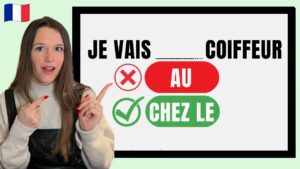In this video, I talk to you about the tics of language that we often hear in France. Er, hein, voila, du coup and other expressions that can sometimes disrupt comprehension. If you liked the video, don't hesitate to like it and subscribe to the channel, it encourages me a lot ! Thank you
- 0:00 - Introduction
- 1:15 - Small
- 2:30 - As a result
- 3:47 - You see
- 5:05 - Err...
- 5:47 - Ben
- 6:51 - Here you go
- 8:03 - Hein
- 9:16 - Conclusion
Video Transcript - French Language Tics 100%
Hello, I hope you're well and having a good day. Today, we're going to take a look at some words, expressions and sounds that the French use a lot when speaking. These words, sounds or expressions are actually tics de langage, i.e. things that the French slip into their sentences when they're speaking, but which in fact don't add up to much.
They're a bit like parasitic, useless words, they don't add any meaning to the sentence, to what we're saying. So, for someone who doesn't speak French or who's just learning French, these words will add to the incomprehensibility of the sentence, making it more difficult to understand. Before you start, remember to add subtitles to the video, to make it easier to understand. Don't forget to subscribe to the HelloFrench channel to follow all my videos.
The first word we're going to look at together is small.
- How about a little resto? - Adding "petit" in front of anything and everything to make it sound nicer is very French.
So you may be familiar with this word, which is the opposite of grand, meaning small, big. The French love this word and slip it into many sentences throughout the day, without actually meaning that something is really small. So, for example, I might say to someone, "Let's have a little resto tonight?" or I might say to someone:
"Great little article you sent me" or "I'm sending you a little e-mail". So, in reality, we don't want to say that we go to a smaller restaurant than another, or that the article I read was necessarily small. We use the word "small" in a lot of sentences, as if to soften them, to make the sentence a little more sympathetic. But as you can see, that doesn't mean that things aren't big.
The second word we're going to see, the second expression, is "du coup".
You're my friend, my confidant. So... well... I love it when we hug goodbye.
If you come to France and talk to French people, it's an expression that comes up very, very often, and again, it's a linguistic tic, it doesn't add much meaning to the sentence. It just gets in the way a little, so if you're already trying to understand a French person when it's not your mother tongue, it's a word that makes the sentence more complicated.
So you can put it at the beginning of a sentence, in the middle of a sentence or at the end. For example, I'm going to tell someone who I know has interviewed for a job, I'm going to tell them:
"So, how did your interview go?". The "du coup" is as if I wanted to say. "So what?" "So". But it's true that it doesn't add any value. I could just say, "Did your interview go well? You can also put it at the end of a sentence. For example, I could say to someone, "It's 1 p.m. Are we going to eat then?" Again, I could just say "It's 1 p.m., shall we eat?" It's true that the French love to slip this word du coup in just about everywhere.
The next expression is "you see".
You see the last time when the chick left me there?
Once again, the French use the expression "tu vois" just about everywhere, and it's a veritable tic de langage: even in the same conversation, someone may say it five times. It's often placed at the end of a sentence, as a kind of punctuation mark. For example, I might say to someone, "I don't speak English, so when I go abroad, it's hard to speak, you know?" Of course, you don't expect the person in front of you to reply "No, I don't see". It's really a little bit of a sentence that you add just like that, as if to add volume to the sentence, to give it rhythm. I'll give you another example to help you understand just how useless this expression can be.
For example, if I'm with a friend and I want to tell her about last night, I'll start by saying: "See, yesterday I was at the bar and I bumped into Jonathan. And then we went out for a drink, you know, because I hadn't seen him in a while".
The next expression, it's more of a sound, it's the uh sound.
Hey guys, I quit school uhhh, I quit school at 16.
So, we also use this sound a lot when we speak in French, so again, it's a bit of a parasitic sound, often used to avoid an awkward silence or to show that we're thinking.
For example, if someone asks me "would you like a pizza? I might reply "uh, pasta's more like it" or if someone says "do you know where Caroline is?" "Uh, no idea". So, you see, it's really to show that we're thinking, it's to avoid putting a big silence.
So the next expression again, it's more of a sound, it's the "ben" sound.
Why don't you buy a house here then? No, we'd have to come here all the time.
In reality, well, it's "well" or "and well" mispronounced. So, it's how you pronounce it orally. For example, if you see someone who's a bit sad, you might say "well, what's wrong, have you been crying?" Or another example might be if someone asks me "are you sure you don't have any sugar?" I might reply, "Well, yes". Another example might be if someone asks you "do you have your driver's license?", I might reply "well yes, I passed it when I was 18", as if to say "well yes, remember, you know very well". One last example.
If someone says to you, "Well, your car won't start? "Well yes, I don't know what's going on! "So here, it's more to show that you don't understand the situation. So, you see it can be used in many contexts, so it can be complicated for you to understand what it means, how it's used and how it's used.
Then the next expression is the word "voilà".
Because what really interests me is adventure, human adventure and meeting people.
Sometimes we even say "voilà, voilà". So, it's an expression we often use because we don't know how to conclude or because we're a bit uncomfortable. So it can also be used at the beginning of a sentence. I'll start by giving you an example of when it's used at the beginning of a sentence. For example, if someone asks me to introduce myself, I'll say "voilà, je m'appelle Elisabeth, j'ai 28 ans et j'habite à Paris". I used it because I didn't really know how to start my sentence, I wasn't very comfortable. So it's also often used at the end of a sentence, for example, using the same example, so I can say "My name is Elisabeth, I'm 28, I live in Paris, that's it, that's it". So, it's because I didn't know how to conclude, I wanted to show my interlocutor, the person I'm talking to, that I'd finished.
So, finally, the last sound, the last expression we'll see today, is the "hein" sound.
- So she's solid, eh Serge? - What does he always have to say, eh Serge, eh Serge?
So like "ben", "hein" has many meanings that you have to try to decipher and understand according to the context.
So "huh" can show that you're surprised, that you're annoyed or just sometimes it comes into sentences a little to... to punctuate, so to add a little punctuation to a spoken sentence. I'll give you some examples so you'll understand better.
For example, if someone says to me, "I'm very hot. I might say, "Have a glass of water, eh?" as if to say, "Have a glass of water, eh?" The "eh" here is to emphasize, "You're hot, have a glass of water, eh? In the example I'm going to give now, you'll see, it's more to show surprise. For example, if someone says to me "They ran out of soda at the supermarket, so all I could get was water", I might reply "Huh? to say that I'm really surprised that there's no more soda at all in the supermarket.
That's it for today, I hope you enjoyed this video. If you've heard any other language tics that you don't understand, don't hesitate to put them in the comments so that I can explain them to you. To see more videos, subscribe to the HelloFrench channel.
See you soon.








